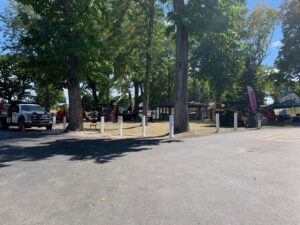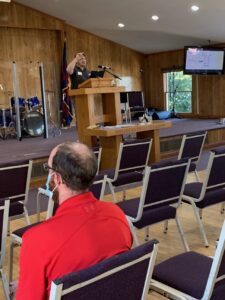By Scott Lyon and Alex Anderson, WI DNR Forest Products Specialists
An urban tree is most valuable while it’s living. However, if that tree is killed or damaged, there are ways to recycle it. As the “buy-local” movement continues to gain momentum, urban wood recycling efforts have increased in Wisconsin. Historically, urban trees were utilized by only a few mills in the state. With the increased number of trees killed by invasive insects and disease, though, municipalities and arborists are seeking alternative uses for urban wood materials, and interest has grown among traditional forest products manufacturers (sawmills, bolt and pallet mills, pulp mills, etc.) to procure this ever-growing resource.
To help municipalities and arborists understand the importance of processing urban trees in a way that meets the raw material specifications of traditional forest products industry, Scott Lyon and Alex Anderson—from the Wisconsin DNR Forest Products Services program—provided two seminars at the Wisconsin Arborist Association’s fall conference in East Troy, WI.
During the conference, which took place in mid-September, they provided an overview of the forest products industry in Wisconsin, as well as information on typical raw material guidelines required by forest products producers. They highlighted the importance of working with local manufacturers before starting to remove trees in order to gain a better understanding of each producer’s needs, including species, volume requirements and specifications.
Attendees learned about different forest products classifications and the typical specifications required to make pulpwood, saw bolts and sawlogs. They provided an overview of defects that mills typically identify when grading and scaling logs to determine yield, which ultimately allows for end uses such as grade lumber, railroad ties or pallet lumber.
Lastly, the attendees were provided examples of how to process urban trees into merchandisable logs, along with tips for storing enough material to meet mill demand. The Forest Products Services program works closely with municipalities and arborists across the state to connect them with potential markets so that they can better utilize and add value to a typically low-value product.

Equipment Demonstation Area

Alex Anderson, DNR Forest Products Specialist, speaking on Wisconsin’s forest products industry.
